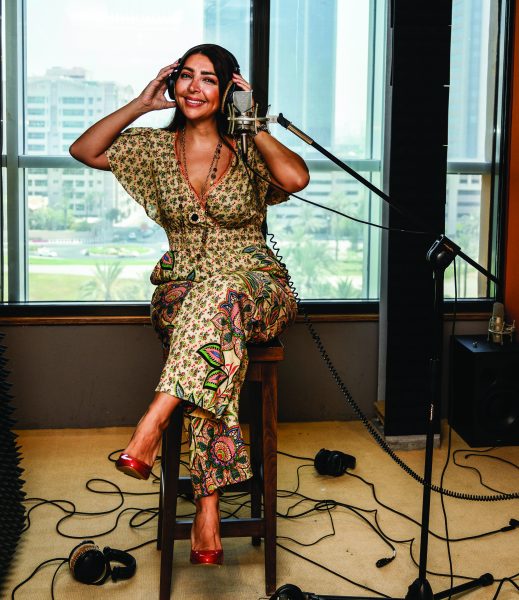 Hi there. Have we met before?
Hi there. Have we met before?
Do you know me?
Of course, you do.
You actually know me really well.
You see, I tag along with you every
single day.
I keep you entertained during your commute to work. I ever so often interrupt your radio, TV and online entertainment stream completely uninvited. I am quite chatty, constantly going on about something or other: a product or a service, and mostly a deal.
I always have something to tell you (“Visit our website for more information”) or announce (“A brand new series, premiering only at these times”) or rush you to (“Hurry up while stocks last”). I also instruct you to “Press 1” or “Please hold the line”, and even tell you the “Doors are closing”. Oh, and you will probably hear me say all this in both English and Arabic.
So, did you make the connection?
My name is Maya Sarji and I am a multilingual voice-over artist and voice actor. I am also a singer-songwriter, voice director and speaking coach.
I often feel I have one of the most challenging jobs on the planet, which is essentially to personify different brands and promote their services or products in under 30 seconds – using just my voice.
There is an ancient Chinese proverb that says, ‘The tongue can paint what the eyes can’t see’, and this is exactly what I do.
The microphone is my closest friend, the headphone is my fanciest accessory and the pop filter is my armour. I have read my fair share of bemusing scripts and have played off-the-wall characters, including an opera singer, a famous Khaleeji cartoon character and a zipper. Good fun, eh?
So, what is being a voice-over really like?
In voice-over work and during pretty much any recording session, there is inevitably a ton of information that we have to get across to the consumer (this is why brands choose to advertise in the first place) and we don’t have all the time in the world to do this. There is also a plethora of different emotions that need to be injected into every script, depending on the idea, context and role. Most importantly, there is a ‘connection’ that has to be established with the ‘brand’ audience. We don’t just read the scripts; we bring the scripts to life.
Your voice says a lot about you and your character as an individual, but as a voice-over artist and brand voice, you lend your voice and your emotions out to the brand, to serve its individual personality, values and message. There is more of the brand and less of you.
It is for this very reason that I like to use the term ‘voice acting’ as opposed to ‘voice-over’, because it is not simply placing the voice over the edit or film. There is much more to it. Even with direct, instructive voice recordings such as announcements and instructional videos, there is still a brand identity that needs to speak louder and clearer than anything else (metaphorically, of course), and this is no easy feat.
People are always fascinated when I talk about my job. They almost always recall a particular tag line I have read or a character I have played or remember hearing my voice at a particular venue. This sense of old acquaintanceship just makes me extremely happy, knowing that a connection has already been made a long time ago. It’s almost like meeting a childhood friend.
Few, however, realise how complicated and complex a voice actor’s job really is. In the absence of body language, facial expressions or props, you have got nothing to work with but your voice. A ‘nice’ or appealing voice could be an advantage, although vocal timbre or quality remains a matter of personal taste. A nice voice, however, is not all that matters for this job; there are other essential criteria to keep in mind, and here are some of them:
1. Talent. A voice actor is an artist at heart, and true, unpretentious talent is paramount for this job. I often say that just because we all have legs doesn’t mean we can all be Lionel Messi. Talent is what sets people apart.
2. Technique and training. Like every job, you need a good set of skills that must be honed and developed. Breathing, articulation, performance and voice projection all require constant practice and perfection because proper technique and training promote flexibility, performance and endurance. An academic musical background will also help tremendously.
3. Tact. By this, I mean social intelligence. The ability to deal with different clients, understand their needs, take directions from them and convert those into deliverables is a talent by itself and is critical for a fruitful recording session.
4. Temperament. Having the right attitude, openness and patience are key personal and professional traits. Not every day is a good day, not every client is low-maintenance and not every recording is a walk in the park.
5. Time. Time makes experience, and experience is the best teacher. No small number of sessions will skyrocket you to mastery; it will all take time.
And no, you will not surely make it if you try to sound like Morgan Freeman.
Remember, the human voice is an amazing instrument. And it’s not what you say, it’s how you say it.









